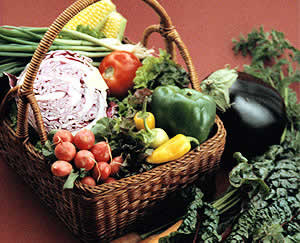Gluten Free
What does following a gluten-free diet mean? That you're embarking on an easy diet with a wide range of health-promoting effects. Instead of dwelling on what you’re giving up, consider that you’re going to enjoy a whole new world of delicious food options to meet your special dietary needs. You’ll be eating seasonally, choosing more fresh fruits and vegetables, focusing on meats, seafood, poultry, legumes, lentils, corn, and rice, and discovering fascinating ancient grains such as quinoa, amaranth, and millet. You’ll be able to eat potatoes, eggs, most cheeses, even chocolate (!)—and enjoy them without guilt because you’ll be taking good care of your body. In fact, you’ll probably end up eating—and feeling—better than ever!
Visit this page for more information about living Gluten Free
---
We carry a large variety of gluten free items, the brands listed below represent just some of the offerings we carry















More Diets
Understanding Organics: Fruits & Vegetables
Organic agriculture utilizes conservation practices that protect soil, water, and air.
How are organic crops grown?
Organic fruits and vegetables are grown without relying on chemical pesticides and fertilizers. Organic growing practices protect the ecosystem, the health of those who work the land, and the long-term well-being of customers who eat the crops. Specifically, organic crops are grown in the following ways:
- Organic crops don’t rely on potentially harmful toxic chemical pesticides, herbicides, fumigants, or synthetic fertilizers.
- Organic produce is never genetically engineered or modified, and is never irradiated.
- Organic farming helps protect our air, soil, water, and food supply from potentially toxic chemicals and other pollutants.
- Organic farming conserves natural resources by recycling natural materials.
What is the difference between “organic” and “transitional”?
Any certified organic plant product must come from fields that have remained free of chemical fertilizers and pesticides for at least three years, and must follow regulations outlined above. Foods grown on lands not yet meeting organic standards may receive a "transitional" label if they follow the strict requirements for conversion.
How do you wash organic produce?
Although organic produce is grown without chemicals, pesticide residue can drift from conventional farms, as well as contaminated soil. Fortunately, properly washing produce can help eliminate most pesticide residue. Follow these tips when cleaning produce:
- Use a biodegradable, nontoxic produce wash containing ingredients derived from natural sources, such as baking soda and citric acid.
- Make your own wash with equal proportions vinegar and water, or put 1 tablespoon (14.5 ml) lemon juice, 2 tablespoons (29 ml) baking soda, and 1 cup (236 ml) water in a spray bottle.
Why does organic food cost more?
Organic agriculture is not subsidized to the same extent as conventional agriculture, and organic practices, such as hand weeding, are often labor-intensive, and therefore more expensive. Because organic farms and industry are generally small, they cannot take advantage of economies of scale. Organic agriculture utilizes conservation practices that protect soil, water, and air; while they do cost more, those who employ and support these practices view the extra cost as an investment in the future.
What if organic produce is unavailable?
For those who are trying to avoid exposure to chemical residue, you can drastically lower your pesticide exposure by eating the conventially produced fruits and vegetables that tend to have the least contamination: asparagus, avocados, bananas, broccoli, cauliflower, corn, kiwi, mangos, onions, papaya, pineapples, and peas.












